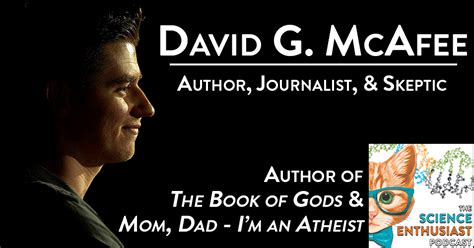A Quote by Richard Dawkins
So Occam's razor - Occam says you should choose the explanation that is most simple and straightforward - leads me more to believe in God than in the multiverse, which seems quite a stretch of the imagination.
Related Quotes
And this shows that people want to be stupid and they do not want to know the truth. And it shows that something called Occam's razor is true. And Occam's razor is not a razor that men shave with but a Law, and it says: Entia non sunt multiplicanda praeter necessitatem. Which is Latin and it means: No more things should be presumed to exist than are absolutely necessary. Which means that a murder victim is usually killed by someone known to them and fairies are made out of paper and you can't talk to someone who is dead.
Occam's razor suggests that, if some event is physically plausible, we don't need recourse to more extraordinary claims for its being. Surely the requirement of an all-powerful deity who somehow exists outside of our universe, or multiverse, while at the same time governing what goes on inside it, is one such claim. It should thus be a claim of last, rather than first, resort.
Christian apologists who argue that a story about an empty tomb is convincing evidence of a resurrected body are likely unfamiliar with Occam’s razor, which states that among competing hypotheses, the hypothesis with the fewest assumptions should be selected. They assume that the most likely explanation is miraculous resurrection through some unproven divine connection, but more likely scenarios include a stolen body, a mismarked grave, a planned removal, faulty reports, creative storytelling, edited scriptures, etc. No magic required.
During my sojourn in ironclad atheism, the primary arsenal leveled against Christianity had been its failure on empirical grounds. Surely, enlightened reason offered a more coherent cosmos. Surely, Occam's razor cut the faithful free from blind faith. There is no proof of God; therefore, it is unreasonable to believe in God.
Were it not for Occam's Razor, which always demands simplicity, I'd be tempted to believe that human beings are more influenced by distant causes than immediate ones. This would especially be true of overeducated people, who are capable of thinking past the immediate, of becoming obsessed by the remote. It's the old stuff, the conflicts we've never come to terms with, that sneaks up on us, half forgotten, insisting upon action.
If you have evidence that C1 is a cause of E, and no evidence as to whether C2 is also a cause of E, then C1 seems to be a better explanation of E than C1&C2 is, since C1 is more parsimonious. I call the version of Ockham's razor used here "the razor of silence." The better explanation of E is silent about C2; it does not deny that C2 was a cause. The problem changes if you consider two conjunctive hypotheses.
People think of faith as being something that you don't really believe, a device in helping you believe simply it. Of course that is quite wrong. As Pascal says, faith is a gift of God. It is different from the proof of it. It is the kind of faith God himself places in the heart, of which the proof is often the instrument... He says of it, too, that it is the heart which is aware of God, and not reason. That is what faith is: God perceived by the heart, not be reason.
I don't think God is an explanation at all. It's simply redescribing the problem. We are trying to understand how we have got a complicated world, and we have an explanation in terms of a slightly simpler world, and we explain that in terms of a slightly simpler world and it all hangs together down to an ultimately simple world. Now, God is not an explanation of that kind. God himself cannot be simple if he has power to do all the things he is supposed to do.




































